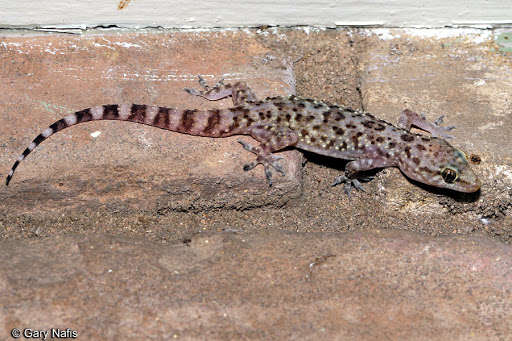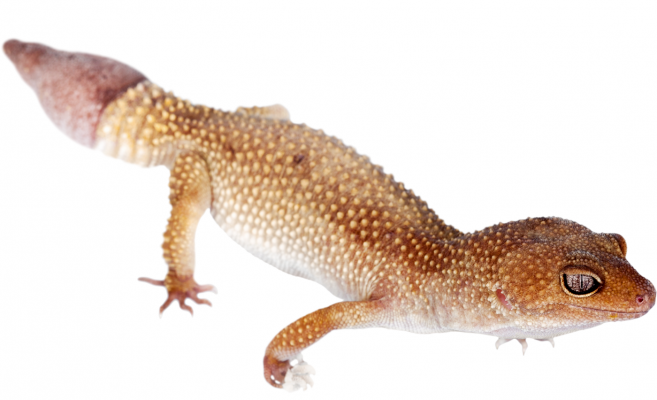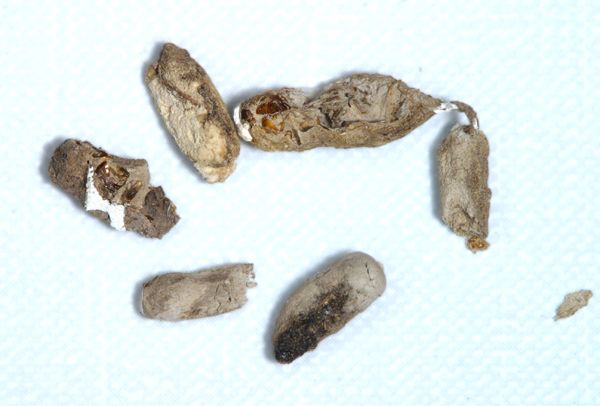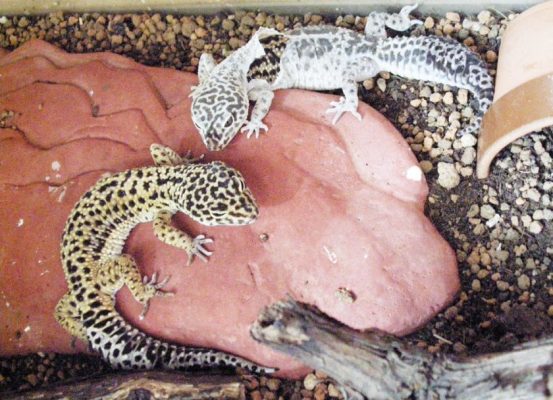Geckos are cute little creatures when they are in an enclosure where they can’t escape.
But when they are roaming around your home or your yard, they can be a bit intimidating.
The worst thing is that they are great at hiding and only come out at night. This means you might not realize you have geckos in your house until they have been there for some time.
Don’t worry; I’m here to help. This post will tell you everything you need to know about geckos and nine effective ways you get rid of them.
What Do Geckos Look Like?
There are many species of geckos, and they come in different shapes and sizes. In general, Geckos are small reptiles with large eyes, large heads, short bodies, thick tails, and four legs. In addition, they have padded toes with adhesive, allowing them to climb virtually any surface.
Types of Geckos
Mediterranean House Gecko

The Meditteranean House Gecko is four to five inches long. It has light-colored, almost grey skin with dark spots. Their belly is translucent.
Their tail tapers towards the end. It has a distinct striped pattern.
You can find the Mediterranean house gecko across different states, including Florida, Kentucky, Texas, Alabama, Florida, California, and Arizona.
Common House Gecko

The Common House Gecko is four and a half inches long, from head to tail.
They range from ash grey to pink with dark patterns. The house gecko has soft skin and a creamy white belly. Their tail tapers towards the end.
These geckos are common in California, Texas, Florida, Alabama, Texas, Nevada, Utah, Louisiana, and Portland but also found in other states as well.
Gecko Behavior: How To Spot a Gecko In its Tracks?
Most part, geckos are pleasant and docile reptiles. But they generally prefer to shy away from humans.
It’s rare for a gecko to bite humans. But, some species are more aggressive than others. For instance, Tokay geckos are known to bite people more often than other geckos.
Male geckos can also be aggressive around other male geckos. If you plan to have a gecko as a pet, keep the males separate from each other.
Most geckos are also nocturnal. However, some are most active during the day, including the day gecko.
Geckos make chirping and clicking noises to attract a mate as well as defend their territory. However, most of the time, geckos are quiet reptiles.
Signs of Geckos
Chirping or clicking noises at night
Geckos make chirping and clicking noises to attract a mate as well as defend their territory.
Because most geckos are nocturnal, you’ll often hear these sounds at night.
https://www.youtube.com/watch?v=XewuPUjF-fc
Gecko Droppings

Gecko droppings are around ¼ inch long and about ⅛ inch wide. Similar to lizards, gecko droppings are distinct because they have a white tip known as the urea cap. After the urea cap, you will find darker feces, which accounts for the remainder of the dropping.
The urea cap is sometimes connected or disconnected. Don’t be alarmed if you find them near one another.
Geckos aren’t particular where they defecate, so you can find them anywhere they have come in contact with.
Seeing Geckos Around Your Home
Common house geckos love hanging out on walls and ceilings.
If you see a few of them hanging out in your ceiling consistently, then it’s likely you have geckos living in your home.
To be sure, check how they got into your house. It could be that they came in through open doors and windows. Or you may have a small crack on your wall where the lizards can come in.
Another place to look for geckos is in areas around your plants. Plants can provide a perfect place for geckos to hide. They also attract insects that geckos like to eat.
Skin Sheds

Geckos shed and replace their skin when it gets old. This process is very similar to humans shedding hair and skin.
If you see a Gecko skin shed lying around your property, then you might be housing a gecko.
That said, finding these skin sheds is rare. Geckos often eat their shed skin to hide it from predators. They don’t want to alert other animals of their presence.
If you do come across one, the shedding will have the shape of a gecko, similar to a mold. You may also find pieces of it.
How To Get Rid of Geckos
1. Seal Your Home
Keep geckos outside your home, sealing any voids, cracks, and crevices that are 1/4 inch or larger. Check your walls, doors, windows, ventilation screens, water pipes, etc. Weatherstrip any gaps on your door.
The best way to seal cracks is using caulk. Its easy to apply and dries quickly.
[amazon box=”B06XCK65QM,B07H9Q8ZZ5,B016TQF65M” grid=”3″]2. Replace or Install Screens
If you like keeping your door open, consider using a door screen. I also recommend that you install screens or covers to your basement and attic vents.
You’ll also want to inspect any broken window or door screens in your home. If you find any, make sure to fix them promptly.
Doing so will not only keep geckos away, but will prevent any insects from getting in your home. Geckos feed on insects, so by keeping them away, you’ll make your home less appealing to geckos.
[amazon box=”B08B3FZ3YM,B07D2WD7VJ,B092HN8JW6″ grid=”3″]3. Eliminate Pest Issues
Geckos feed on tiny insects such as mosquitoes, roaches, and flies. So, one of the best ways to keep them off your property is by getting rid of pests.
For this, I recommend a natural option such as Diatomaceous Earth (DE).
While using commercial pesticides can work, they will likely kill the geckos in the process.
DE, on the other hand, is harmless to lizards, animals, and humans. But it will kill most pests and are easily available for purchase online or at your local stores.
4. Remove clutter
Removing clutter in your home gets rid of geckos in two ways:
The first is that it eliminates hiding spots for geckos. The second is that it makes your home less attractive to geckos’ food: small insects.
Most geckos are nocturnal, so they will often hide in tight places that offer shade and shelter during the day. At night, they will leave their hiding spots to forage for food.
Cleaning makes it easier to spot geckos and remove them from your home. It also makes it harder for them to find and create new hiding spots.
Cleaning will also help you get rid of other pests such as ants, cockroaches, and flies. Getting rid of these pets will eliminate the geckos’ food source.
Once you’ve removed all the clutter, take the time to vacuum also thoroughly. Remember to clean in hard-to-reach areas such as under appliances and behind shelves. This will help eliminate food sources for other pests such as ants.
5. Keep Your Yard Well Maintained
Geckos feed on tiny insects. Having an unkempt yard attracts other pests that are a perfect meal for geckos.
Insects love thick vegetation. It provides a safe place for them to live and reproduce. By maintaining your yard, you can discourage other pests from infesting your home.
Keep pests away by making sure to trim any excess vegetation. Pick up fallen branches. And remove any rotten organic materials.
5. Eliminate sources of moisture
Geckos are attracted to areas with high humidity. To get rid of geckos, consider getting a humidifier in humid rooms such as attics, washrooms, and basements.
You can check the humidity levels inside your home using a small humidity sensor. These sensors are pretty cheap and easy to use. Simply place them in the room you want to monitor.
Moisture is also key to many insects’ survival. Having insects in your home will provide geckos with a rich source of food and encourage them to stay,
By eliminating excess water, you not only discourage geckos from staying, but you also minimize the insects in your house.
Make sure to fix leaky pipes, sprinkler faucets. Dump any standing water.
6. Glue traps
Glue traps are effective in catching and get rid of geckos. They work as both indoors and outdoors traps.
You can place these traps in any other areas where geckos frequent, including near cracks in walls, under eaves, and behind downspouts.
One major disadvantage of glue traps, however, is that the glue traps will likely kill lizards. This is because once the lizard is glued, it’s hard to get them off.
7. DIY Traps
DIY traps are another way you can get rid of geckos. The benefit of using DIY traps is that they are humans.
You can trap geckos and release them away from your home.
The best part of DIY traps is making them using household items such as two-liter bottle or cardboards boxes.
You can create a simple DIY trap using a two-liter bottle. Cut the top off of the bottle so what remains in your hand looks like a funnel.
Place this funnel on top of the trap so that it functions as a funnel. To make the trap more enticing, you can spray the inside of the bottle with a few squirts of water and add bait.
The best bait for geckos are small insects such as mealworms, ladybugs, crickets, or rolly-polys. The best thing is that you can use any insect you find in your yard to bait geckos.
This will attract the geckos inside, but they will not be able to leave. With these traps, you can release the geckos away from your home without killing them.
https://www.youtube.com/watch?v=swZtwKtOoN0
8. Eucalyptus and Peppermint Oil
Eucalyptus and Peppermint Essential Oil are effective repellents against geckos.
Most people don’t realize that geckos have a very strong sense of smell. They are also nocturnal, which means they rely heavily on their smell and hearing.
You can use this sense of smell to your advantage. When they smell a very strong scent, this will drive them away. The strong smell will trigger a defense mechanism, and they will avoid it.
For this, mix 15 drops or either Eucalyptus and Peppermint Essential Oil in an 8 oz bottle filled with water.
Spray on areas where geckos frequent. Spray on walls, under eaves, and behind downspouts, and around your yard. The spray should repel geckos away from your house.
Make sure to re-apply daily as this method wears off quickly.
9. Cayenne Pepper
Cayenne pepper is another known natural repellent spray against geckos.
While harmless, the pepper is irritating to geckos’ skin, forcing them to avoid it.
For this, mix the pepper into the water and spray it in places where geckos frequent.
If you apply it outdoors, I recommend reapplication every couple of days as the elements can minimize its effectiveness.
How to get rid of geckos naturally
The best way to get rid of geckos naturally around your home is to use natural repellents, traps, or habitat modification.
Geckos rely heavily on their sense of smell. You can use this to your advantage by using strong scents to get rid of geckos.
Some effective natural repellents include essential oils and cayenne pepper spray.
Another way you can get rid of geckos naturally is by setting traps. The best option for traps is to create your own using household items such as plastic bottles or cardboard boxes. To make them more effective, you can bait them with small insects such as mealworms or roly polys. These insects are easy to find around homes and easy to purchase online.
The next way you can get rid of geckos is to modify their habitat. This includes making it less attractive to geckos. You can do this by:
- Keeping your garden clean
- Removing clutter from your home
- Reducing the number of hiding spots
- Eliminating food sources by getting rid of other insect populations
How To get Rid of Geckos In Air Conditioner?
The best way to get rid of geckos around or in your air conditioner is to use repellents.
Inside air conditioners you can spray natural repellents inside or around the exterior such as essential oil and cayenne pepper spray.
If you want to avoid using liquids you can place moth balls on the inside of you air conditioner.
Reapplying your repellents is crucial to keeping geckos out of your air conditioner. You should reapply every few days to every week to keep it as effective as possible.
Another option is to seal the area around your air conditioner with wire mesh. Typically this will keep geckos out and will still allow airflow around the air conditioner.
If the gecko is inside your air conditioner you can use a live trap with bait inside. Once you trap the gecko you can follow the method above to keep geckos out of your air conditioner.
How To get Rid of Geckos On Patio?
The best way to get rid of geckos on your patio is a defensive approach.
Apply repellents around the border of your patio.
You can use commercial repellents or natural repellents to keep the geckos away from your patio.
Remember to reapply the repellent at often as possible to ensure that it is effective.
Some other tips to help get rid of geckos on your patio include:
- Reducing hiding spots
- Eliminating other insect issues
- Keeping lights on at night
- Trap the geckos using live traps or glue traps
Frequently Asked Questions (FAQ)
Where Do Geckos Live (Distribution)?
Geckos are adaptable aphabians and they live throughout the Untied States. live in many states across the United States. They are commonly found along the costal states.
The states with the largest gecko populations are California, Texas, Florida, Alabama, Texas, Nevada, Utah, Louisiana, and Portland.
Geckos are found in other states as well but are less common.
Common house geckos originated in Souther Asia and the Pacific but due to travel and trade they are now found across South America, North America, Africa, and Asia
Are Geckos Dangerous?
Geckos are generally harmless to humans. They are docile and rarely attack.
It’s unlikely for a gecko to bite humans. But they may do so when they feel threatened.
Gecko bites are pretty shallow and generally painless.
The biggest danger geckos pose to humans is their ability to carry Salmonella. Geckos can carry salmonella in their mouths and feces. So you can get Salmonella from geckos with both direct and indirect contact.
While Salmonella is harmless to geckos, it can make you very sick. It can cause flu-like symptoms and sometimes even be life-threatening.
Do Geckos Carry Disease?
Yes, Geckos, along with other amphibians, are known to spread Salmonella. They primarily spread Salmonella through their feces, but the bacteria can also get on their bodies, and anywhere they come in contact with.
As a result, they can spread Salmonella by direct or indirect contact.
How to catch a gecko
The best way to catch a gecko is to make a homemade trap with bait inside. You can make homemade traps out of household items such as plastic bottles or cardboard boxes.
One of the most effective options is a simple DIY trap using a two-liter bottle. Cut the top off of the bottle so what remains in your hand looks like a funnel.
Place this funnel on top of the trap so that it functions as a funnel. To make the trap more enticing, you can spray the inside of the bottle with a few squirts of water and add bait.
While you can use bait such as crackers or fruit, these are not as effective as small insects.
Placing small insects that you can purchase at local pet shops or online such as mealworms, crickets, or roly polys, are perfect bait options for geckos.
How do geckos get in your house?
Geckos get into your house through common opening such as under doors, cracks, holes, crevices, open windows, or ripped screens.
Since they are very good climbers, they can access almost any entry point with ease. It important that you seal all entry points around your home to keep geckos out of your home.
What Do Geckos Eat?
Geckos are insectivores which means they eat primarily small insects. Their diet will include anything that they can overpower or fit into their moth.
Below are some of the insects that geckos feed on:
How To Get Rid of Gecko Poop?
To clean gecko poop, you need first to vacuum and then disinfect the area.
Gecko feces tends to dry quickly, so by the time you find it should be easy to vacuum.
If the feces is anywhere in your house or outdoors where people contact you, you should disinfect the area.
You should also disinfect surrounding areas because this means the gecko walked over the surface.
To disinfect, you can use a simple combination of hot water and bleach or store-bought bleach wipes.
